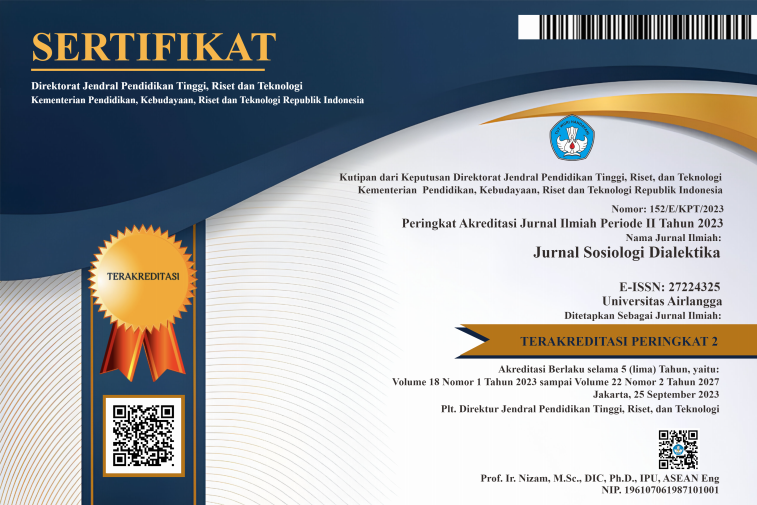Hegemonic practices of online local fashion brands in the information society era during the Covid-19 pandemic
Downloads
The Covid-19 pandemic has had an impact on people around the world, including in Indonesia, particularly regarding the social and economic aspects of life, including the online economic agents. This study looks at and analyzes the hegemonic practices carried out by online economic agents in relation to the consumer so then they can survive and benefit during the Covid-19 pandemic. The theory used is hegemony according to Antonio Gramsci. This study used a qualitative research design. The research subjects were the owners of online local fashion brands that have developed in East Java. The primary data was collected from interviews and secondary data is from books and journal articles. The results of this study show that the local brands had a good level of performance during the Covid-19 pandemic, as seen from the observations conducted on Instagram. Hegemonic practices by online economic agents consist of three methods. First, there is using the social media platform Instagram. Second, there is always being productive. Third, there is collaborating with social media influencers (endorsement). The hegemonic practices happened by the social media so that it can influence people to follow their Instagram accounts and buy the products offered.
Amalia HA (2020) Social distancing munculkan dua perilaku baru. [Accessed 17 June 2020]. https://investor.id/lifestyle/social-distancing-munculkan-dua-perilaku-baru.
Anjani S & Irwansyah (2020) Peranan influencer dalam mengkomunikasikan pesan di media sosial Instagram (the role of social media influencers in communicating messages using Instagram). Polyglot: Jurnal Ilmiah 16 (2):203-229.
BEKRAF (2020) Laporan Kinerja Badan Ekonomi Kreatif 2019. Jakarta: Badan Ekonomi Kreatif Indonesia.
Berawi MA (2020) Empowering healthcare, economic, and social resilience during global pandemic Covid-19. International Journal of Technology 11 (3): 436-39.
Bethune Z, Bruno S & Nicholas T (2019) An Information-based theory of financial intermediation, 19–12. [Accessed 6 December 2020]. https://ssrn.com/abstract=3473118.
Boothman D (2008) The sources for Gramsci's concept of hegemony. Rethinking Marxism 20:201-15. doi:10.1080/08935690801916942.
Cartwright S, Davies I & Archer-Brown C (2021) Managing relationships on social media in business-to-business organisations. Journal of Business Research 125 (March 2020):120-34. doi: 10.1016/j.jbusres.2020.11.028.
Clemons EK, Dewan RM, Kauffman RJ & Weber TA (2017) Understanding the information-based transformation of strategy and society. Journal of Management Information Systems 34 (2):425-56.
Dahiya K & Potia A (2020) Optimistic digital generous : Covid-19's impact on Indonesian consumer sentiment. The Jakarta Post. [Accessed 7 December 2020]. https://www.thejakartapost.com/academia/2020/04/19/optimistic-digital-generous-covid-19s-impact-on-indonesian-consumer-sentiment.html.
Donthu N & Anders G (2020) Effects of Covid-19 on business and research. Journal of Business Research 117:284-89. doi:10.1016/j.jbusres.2020.06.008.
Fatoni, Nur S, Susilawati C, Yulianti L & Iskandar (2020) Dampak Covid-19 terhadap perilaku konsumen dalam penggunaan e-wallet di Indonesia. Thesis, UIN Sunan Gunung Djati, Bandung.
Gulbe M (2015) Quantitative characteristics of information society and ICT industry in Latvia. Procedia Economics and Finance 26 (15):682-87. doi:10.1016/s2212-5671(15)00810-2.
Hanoatubun S (2020) Dampak Covid-19 terhadap prekonomian Indonesia. Journal of Education, Psycology, and Counseling 2 (1):146-53.
Hermanda A, Sumarwan U & Tinaprillia N (2019) The effect of social media influencer on brand image, self-concept, and purchase intention. Journal of Consumer Sciences 4 (2):76-89.
Hutagalung D (2004) Hegemoni, kekuasan dan ideologi. Jurnal Pemikiran Sosial, Politik dan Hak Asasi Manusia 12:1-17.
Laxman PP (2007) Perpustakaan Digital: Perspektif Perpustakaan Perguruan Tinggi Indonesia. Jakarta: Sagung Seto.
Lubis MSW (2020) Begini perubahan perilaku konsumen gara-gara corona. [Accessed 17 June 2020]. https://ekonomi.bisnis.com/read/20200414/12/1227101/begini-perubahan-perilaku-konsumen-gara-gara-corona
Mackey A, Wakkary R, Wensveen S & Tomico O (2017) Can I wear this? Blending clothing and digital expression by wearing dynamic fabric. International Journal of Design 11 (3):51-65.
Mahriani E (2020) Model bisnis di tengah pandemi Covid-19. Jurnal Hadratul Madaniyah 7 (1):9-14. doi: 10.33084/jhm.v7i1.1596.
Manitoba Analytics (2020) Impact of advertising on consumer behaviour. [Accessed 15 November 2020]. https://www.gov.mb.ca/agriculture/markets-and-statistics/economic-analysis/pubs/impact-of-covid-on-consumer-behaviour.pdf.
Neger M & Udin B (2020) Factors affecting consumers' internet shopping behavior during the COVID-19 pandemic: Evidence from Bangladesh. Chinese Business Review 19 (3):91-104.
Olanrewaju AST, Mohammad AH, Naomi W & Paul M (2020) Social media and entrepreneurship research: A literature review. International Journal of Information Management 50:90-110.
Prawoto N, Eko PP & Abitassha A (2020) The impacts of Covid-19 pandemic on socio-economic mobility in Indonesia. International Journal of Economics and Business Administration 8 (3):57-71.
Satuan Tugas Penanganan COVID-19 (2021) Peta sebaran Covid-19. [Accessed 31 January 2021]. https://covid19.go.id/peta-sebaran-covid19.
Sheth J (2020) Impact of Covid-19 on consumer behavior: Will the old habits return or die? Journal of Business Research 117:280-283.
Strinati D (2010) Popular Culture Pengantar Menuju Teori Budaya Populer. Jogjakarta: Ar-Ruzz Media.
Suryahadi A, Ridho A & Daniel S (2020) Estimating the impact of Covid-19 on poverty in Indonesia. Bulletin of Indonesian Economic Studies. doi: 10.1080/00074918.2020.1779390.
Sutarno NS (2006) Perpustakaan dan Masyarakat. Jakarta: Sagung Seto.
Suyanto B & Sutinah (2007) Metode Penelitian Sosial Berbagai Alternatif Pendekatan. Jakarta: Prenadamedia Group.
Watanabe T & Yuki O (2020) Central bank communication design working paper series online consumption during the COVID " 19 crisis : Evidence from Japan. JSPS Grant"in"Aid for Scientific Research (S) 023(023):39.
Wielki J (2020) Analysis of the role of digital influencers and their impact on the functioning of the contemporary on-line promotional system and its sustainable development. Sustainability (Switzerland) 12 (17):1-20.
World Health Organization (2021) WHO coronavirus disease (COVID-19) dashboard. [Accessed 31 January 2021]. https://covid19.who.int/?gclid=Cj0KCQiA06ABhDMARIsAFVdQv_7jLuD9iLEOgIUJQJrLEjci4wTtoFYLBptvy7UXoss3FkWV5tnWg4aAjnmEALw_wcB.
Yamali FR & Ririn NP (2020) Dampak pandemi Covid-19 terhadap ekonomi Indonesia. Ekonomis: Journal of Economics and Business 4 (2):384-388.
1. Copyright of this journal is possession of Editorial Board and Journal Manager, by the knowledge of author, whilst the moral right of the publication belongs to the author.
2. Legal formal aspect of journal publication accessibility refers to Creative Commons Attribution-NonCommercial-ShareAlike (CC BY-NC-SA), implies that publication can be used for non-commercial purposes in its original form (cannot be modified).
3. Every publications (printed/electronic) are open access for educational purposes, research, and library. Other that the aims mentioned above, editorial board is not responsible for copyright violation.















